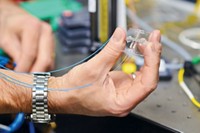Advertisement
Grab your lab coat. Let's get started
Welcome!
Welcome!
Create an account below to get 6 C&EN articles per month, receive newsletters and more - all free.
It seems this is your first time logging in online. Please enter the following information to continue.
As an ACS member you automatically get access to this site. All we need is few more details to create your reading experience.
Not you? Sign in with a different account.
Not you? Sign in with a different account.
ERROR 1
ERROR 1
ERROR 2
ERROR 2
ERROR 2
ERROR 2
ERROR 2
Password and Confirm password must match.
If you have an ACS member number, please enter it here so we can link this account to your membership. (optional)
ERROR 2
ACS values your privacy. By submitting your information, you are gaining access to C&EN and subscribing to our weekly newsletter. We use the information you provide to make your reading experience better, and we will never sell your data to third party members.
Policy
International fusion project moves ahead
May 29, 2006
| A version of this story appeared in
Volume 84, Issue 22
The U.S. and six international partners announced last week an agreement to begin construction of the $12 billion International Thermonuclear Experimental Reactor (ITER) in southern France. Construction of the fusion energy project is to begin late this year and will take eight years, said Raymond L. Orbach, head of the Energy Department's Office of Science, who represented the U.S. in international negotiations with the European Union, Russia, Japan, China, India, and South Korea. The EU will pay 45.4% of the construction costs, and the rest will be shared by the U.S. and the five other partners, each contributing 9.1% or $1.1 billion. Speaking from Brussels, Orbach laid out a long history of U.S. involvement in the fusion project, stretching back to the Reagan presidency. Although U.S. leaders have run hot and cold on this international collaboration, Orbach said it was a top science priority for the Bush Administration. The demonstration project will pave the way for development of fusion, he said, calling it a "transformational" energy technology of the future. To give the U.S. greater access to the reactor, the U.S. cost share will increase to 13% of operational expenses, Orbach said. He predicted a 20-year shakedown phase for the project's operation. The agreement must be approved by Congress, which has 120 days to review it under the terms of last year's Energy Policy Act.



Join the conversation
Contact the reporter
Submit a Letter to the Editor for publication
Engage with us on Twitter